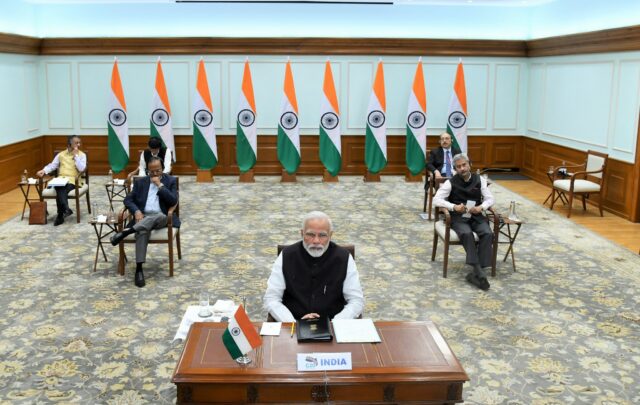NEW DELHI: In an extraordinary video-conference of leaders of G-20 countries to discuss the Covid-19 pandemic on Thursday, India said it had found the World Health Organization (WHO) seriously wanting in its role. Choosing his words deliberately, Prime Minister Narendra Modi said the WHO needed to be “strengthened and reformed”, with sources confirming that Modi faulted the UN’s apex health agency as it “continues to be based on the last century’s model.”
Modi noted that the “WHO initially did not have the mandate to deal with a pandemic of this sort, which is why empowering of the WHO is necessary be it in terms of capacity of early warning or development of effective vaccines or capacity building.”
India’s criticism of the WHO is not unexpected given that the organisation has been under attack on various counts including its failure to declare Covid-19 a pandemic earlier than it should have. US President Donald Trump has been critical of the WHO, even accusing it of being on the side of China where Covid-19 cases were first detected.
That WHO has now been advised by G-20 leaders to work with other organisations “to assess gaps in pandemic preparedness and report to a joint meeting of finance and health ministers in the coming months, with a view to establish a global initiative on pandemic preparedness and response”.
Modi also had some advice for the wealthy cabal of nations in the G-20. He called upon them to look beyond purely economic and trade agendas to focus on the well being of humankind. He warned that the human aspects of globalisation had been subsumed by an economic focus and there was need for the G-20 nations to broaden their concept of globalisation with humanity at the centre.
The ministry of external affairs quoted him as underscoring “the need to put human beings at the centre of our vision of global prosperity and cooperation, freely and openly share the benefits of medical research and development….”
His remarks did not pass unnoticed. G-20 leaders resolved “to take all necessary health measures and seek to ensure adequate financing to contain the pandemic and protect people, especially the most vulnerable.” They agreed to “share timely and transparent information; exchange epidemiological and clinical data; share materials necessary for research and development; and strengthen health systems globally, including through supporting the full implementation of the WHO International Health Regulations (IHR 2005).”
But with the global economy in free fall, G-20 leaders decided to pump in over $5 trillion into the global economy in what the communique issued at the end of the summit described as “part of targeted fiscal policy, economic measures, and guarantee schemes to counteract the social, economic and financial impacts of the pandemic.”
They also resolved to “continue to conduct bold and large-scale fiscal support. Collective G-20 action will amplify its impact, ensure coherence, and harness synergies”. Hoping that the magnitude of this response would help the global economy back on its feet, the communique said that G-20 finance ministers and governors of central banks will coordinate on a regular basis to work out a G-20 Action Plan to deal with the fall-out of Covid-19.
Chinese President Xi Jinping, in his remarks, sought to counter accusations of opaqueness and indeed attempts to hide the Covid-19 outbreak when it first broke out by maintaining that his country “acted with openness and transparency.” Stating that the outbreak caught his country “by surprise”, President Xi then remarked, “What we fought was a people’s war against the outbreak. He also backed the WHO “in leading the global efforts to develop science-based and proper control and treatment and minimize cross-border spread” for Covid-19.
The Chinese President also called for the enhancement of international macro policy coordination and the need to take collective actions like cutting tariffs, removing barriers, and facilitating the unfettered flow of trade.
The issue of Covid-19 being described as the ‘Chinese Virus’ or the ‘Wuhan virus’ by many including the US was not raised during the meet. With the US and China having reportedly agreed not to drag their blame game to the video conference, it was not raised by anybody and the discussions were cooperative in nature, said sources.

















